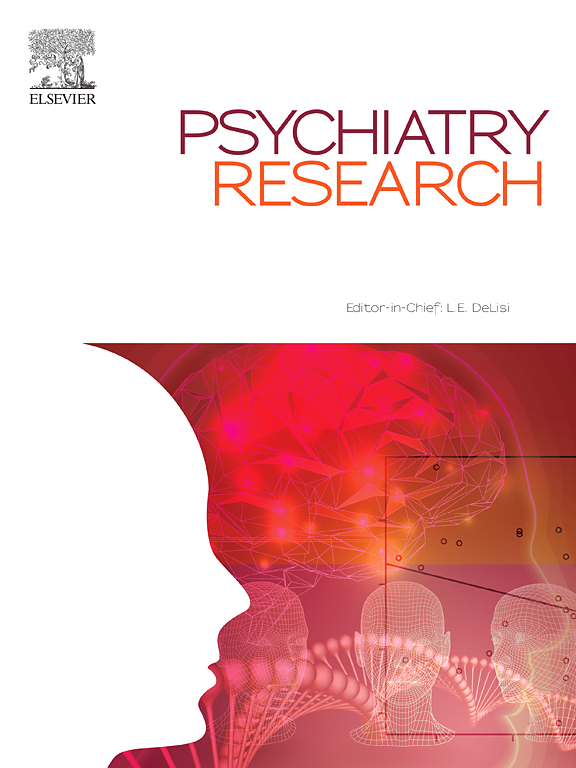Maternal vitamin B12 during pregnancy and schizophrenia in offspring
IF 4.2
2区 医学
Q1 PSYCHIATRY
引用次数: 0
Abstract
Background
Maternal nutritional deficiency is linked with several adverse outcomes in offspring but the link between maternal vitamin B12 levels and offspring schizophrenia remains unexplored.
Methods
In this nationwide population-based nested case-control design, 1145 schizophrenia cases were born between 1987-1997 and diagnosed by 2017 and each case were matched with a control. Maternal vitamin B12 levels during the first and early second trimesters of pregnancy were measured using chemiluminescence microparticle immunoassay from maternal sera. Conditional logistic regression was used to examine the association between maternal vitamin B12 levels and offspring schizophrenia.
Results
Low maternal vitamin B12 levels were not associated with offspring schizophrenia in unadjusted (OR 1.04, 95% CI 0.88-1.24) or adjusted analyses (aOR 1.14, 95% CI 0.95-1.37). When analyzed by quintiles, no significant association was observed between the lowest versus highest quintile of maternal vitamin B12 levels and schizophrenia in unadjusted (OR 1.01, 95% CI 0.78-1.30) or adjusted analyses (OR 0.89, 95% CI 0.68-1.17).
Conclusion
Maternal vitamin B12 levels in early pregnancy were not associated with offspring schizophrenia. Future studies measuring both genetic and environmental factors are required to elucidate the role of maternal vitamin B12 deficiency in schizophrenia and its potential pathways to influence schizophrenia in offspring.
孕期母体维生素 B12 与后代的精神分裂症。
背景:母体营养缺乏与后代的多种不良后果有关,但母体维生素 B12 水平与后代精神分裂症之间的联系仍未得到研究:母体营养缺乏与后代的多种不良后果有关,但母体维生素B12水平与后代精神分裂症之间的联系仍未得到探讨:在这项基于全国人口的巢式病例对照设计中,1145例精神分裂症病例出生于1987-1997年间,并在2017年之前确诊,每例病例均与对照组匹配。采用化学发光微粒子免疫测定法测定了妊娠头三个月和后三个月早期母体血清中的维生素 B12 水平。结果发现,母体维生素 B12 水平低与子代精神分裂症之间的关系并不明显:在未调整分析(OR 1.04,95% CI 0.88-1.24)或调整分析(aOR 1.14,95% CI 0.95-1.37)中,母体维生素 B12 水平低与后代精神分裂症无关。如果按五分位数进行分析,在未调整分析(OR 1.01,95% CI 0.78-1.30)或调整分析(OR 0.89,95% CI 0.68-1.17)中,均未观察到母亲维生素 B12 水平最低五分位数与最高五分位数与精神分裂症之间存在显著关联:结论:孕早期母体维生素 B12 水平与后代精神分裂症无关。未来的研究需要同时测量遗传和环境因素,以阐明母体维生素B12缺乏在精神分裂症中的作用及其影响后代精神分裂症的潜在途径。
本文章由计算机程序翻译,如有差异,请以英文原文为准。
求助全文
约1分钟内获得全文
求助全文
来源期刊

Psychiatry Research
医学-精神病学
CiteScore
17.40
自引率
1.80%
发文量
527
审稿时长
57 days
期刊介绍:
Psychiatry Research offers swift publication of comprehensive research reports and reviews within the field of psychiatry.
The scope of the journal encompasses:
Biochemical, physiological, neuroanatomic, genetic, neurocognitive, and psychosocial determinants of psychiatric disorders.
Diagnostic assessments of psychiatric disorders.
Evaluations that pursue hypotheses about the cause or causes of psychiatric diseases.
Evaluations of pharmacologic and non-pharmacologic psychiatric treatments.
Basic neuroscience studies related to animal or neurochemical models for psychiatric disorders.
Methodological advances, such as instrumentation, clinical scales, and assays directly applicable to psychiatric research.
 求助内容:
求助内容: 应助结果提醒方式:
应助结果提醒方式:


